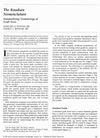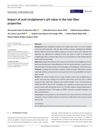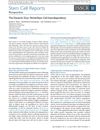 September 1997 in “JEADV. Journal of the European Academy of Dermatology and Venereology/Journal of the European Academy of Dermatology and Venereology”
September 1997 in “JEADV. Journal of the European Academy of Dermatology and Venereology/Journal of the European Academy of Dermatology and Venereology” The document concludes that treatments like oral anti-androgens, minoxidil, and topical spironolactone can be effective for hair loss in men and women.
 September 1997 in “Journal of The European Academy of Dermatology and Venereology”
September 1997 in “Journal of The European Academy of Dermatology and Venereology” Topical spironolactone effectively treats hair loss in women.
 234 citations,
December 1996 in “Journal of The American Academy of Dermatology”
234 citations,
December 1996 in “Journal of The American Academy of Dermatology” Middle-aged women with chronic telogen effluvium experience increased hair shedding but usually don't get significantly thinner hair.
 37 citations,
January 2002 in “British journal of dermatology/British journal of dermatology, Supplement”
37 citations,
January 2002 in “British journal of dermatology/British journal of dermatology, Supplement” Apple extract called procyanidin B-2 was found to greatly increase hair growth.
 17 citations,
June 2012 in “European journal of medicinal chemistry”
17 citations,
June 2012 in “European journal of medicinal chemistry” New steroid compounds effectively inhibit 5α-reductase and may treat hair loss.
 15 citations,
June 1995 in “The American Journal of the Medical Sciences”
15 citations,
June 1995 in “The American Journal of the Medical Sciences” Finasteride caused enlarged breast tissue in a 62-year-old man.
 5 citations,
September 1997 in “Dermatologic Surgery”
5 citations,
September 1997 in “Dermatologic Surgery” Dr. Russell Knudsen's system classifies hair grafts by class, shape, and size for clearer communication in hair restoration surgery.
 3 citations,
November 2019 in “Journal of Investigative Dermatology”
3 citations,
November 2019 in “Journal of Investigative Dermatology” Adenosine helps human hair grow and prevents hair loss by targeting specific cells.
 3 citations,
June 2019 in “Journal of cosmetic dermatology”
3 citations,
June 2019 in “Journal of cosmetic dermatology” Lower pH straighteners change hair more but weaken it.
 May 2020 in “bioRxiv (Cold Spring Harbor Laboratory)”
May 2020 in “bioRxiv (Cold Spring Harbor Laboratory)” The study found that certain genes are important for hedgehog skin appendage development and immunity, with spines possibly evolving for protection and infection resistance.
 September 2019 in “Journal of Investigative Dermatology”
September 2019 in “Journal of Investigative Dermatology” Dermal Papilla Cells grown in 3D and with stem cells better mimic natural hair growth conditions than cells grown in 2D.
 September 2019 in “Journal of Investigative Dermatology”
September 2019 in “Journal of Investigative Dermatology” The 3D-SeboSkin model effectively simulates Hidradenitis suppurativa and is useful for future research.
 May 2014 in “JAMA Dermatology”
May 2014 in “JAMA Dermatology” Mother and son diagnosed with a rare genetic hair loss condition with no effective treatment.
 May 2012 in “The journal of nervous and mental disease”
May 2012 in “The journal of nervous and mental disease” The book provides comprehensive information on Impulse Control Disorders but lacks definitive evidence for effective treatments.
 73 citations,
August 2011 in “Stem Cell Research”
73 citations,
August 2011 in “Stem Cell Research” Human hair follicle stem cells can turn into multiple cell types but lose some of this ability after being grown in the lab for a long time.
 71 citations,
March 1995 in “Journal of The American Academy of Dermatology”
71 citations,
March 1995 in “Journal of The American Academy of Dermatology” Using both vertical and transverse sections for alopecia biopsies improves diagnosis without extra cost.
 53 citations,
October 2012 in “The FASEB Journal”
53 citations,
October 2012 in “The FASEB Journal” Bimatoprost, a glaucoma medication, may also help treat hair loss.
 48 citations,
February 2013 in “Molecular and Cellular Endocrinology”
48 citations,
February 2013 in “Molecular and Cellular Endocrinology” The protein StAR is found in 17 different organs and can affect hair loss and brain functions, but its full role is not yet fully understood.
 46 citations,
February 2016 in “Experimental Dermatology”
46 citations,
February 2016 in “Experimental Dermatology” Genes play a significant role in male-pattern baldness, and understanding them could lead to new treatments and insights into related health issues.
 46 citations,
January 1996 in “Journal of The American Academy of Dermatology”
46 citations,
January 1996 in “Journal of The American Academy of Dermatology” People with late-stage HIV-1 often experience a specific type of hair loss linked to multiple factors, including nutritional issues and immune responses.
 45 citations,
November 2015 in “Dermatologic Clinics”
45 citations,
November 2015 in “Dermatologic Clinics” Hormones might affect the skin condition hidradenitis suppurativa, but their exact role is unclear.
 41 citations,
May 2018 in “Nutrition and healthy aging”
41 citations,
May 2018 in “Nutrition and healthy aging” Skin aging is largely due to differences in stiffness and elasticity between skin layers, leading to wrinkles.
 40 citations,
May 2010 in “Australasian Journal of Dermatology”
40 citations,
May 2010 in “Australasian Journal of Dermatology” Chronic hair shedding may be caused by less variation in hair growth times and might stop on its own after several years.
 39 citations,
March 2018 in “Archives of Dermatological Research”
39 citations,
March 2018 in “Archives of Dermatological Research” Androgens may block hair growth signals, targeting this could treat hair loss.
 37 citations,
January 1987 in “Dermatology”
37 citations,
January 1987 in “Dermatology” Minoxidil stimulates hair growth by increasing hair thickness and prolonging growth phase.
 34 citations,
November 2010 in “Development”
34 citations,
November 2010 in “Development” Activating Notch in adult skin causes T cells and neural crest cells to gather, leading to skin issues.
 32 citations,
January 2000 in “Skin pharmacology and physiology”
32 citations,
January 2000 in “Skin pharmacology and physiology” Certain substances that block a specific protein help promote hair growth.
 31 citations,
May 2015 in “Stem Cell Reports”
31 citations,
May 2015 in “Stem Cell Reports” Stem cells and their surrounding environment in hair follicles work closely together, affecting hair growth and having implications for cancer and tissue regeneration.
 30 citations,
June 2006 in “British journal of dermatology/British journal of dermatology, Supplement”
30 citations,
June 2006 in “British journal of dermatology/British journal of dermatology, Supplement” Oral zinc sulphate reduces dark hair color in mice.
 28 citations,
June 2010 in “European Journal of Cancer”
28 citations,
June 2010 in “European Journal of Cancer” Baldness at age 40 is not linked to a higher risk of aggressive prostate cancer.






























